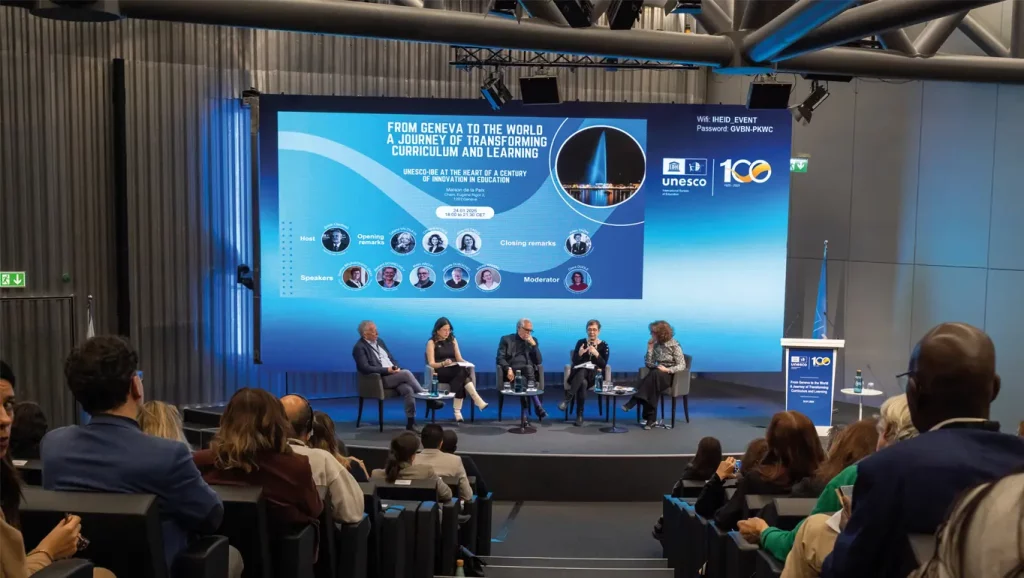In 2025, the International Bureau of Education (IBE), UNESCO’s specialized institute for curriculum, marks its 100th anniversary.
Celebrating the Centenary of the International Bureau of Education: a Geneva institution driving systemic change in education
Based in Geneva, the IBE has been at the forefront of shaping global education, advancing curriculum development, comparative education, and educational diplomacy for 100 years. Its continued mission is to promote more equitable, inclusive, and sustainable education systems around the world.
A legacy of comparative education and diplomacy
Founded in 1925 in the post-WWI period, the IBE aligned with the League of Nations and the Esprit de Genève, which sought to foster global peace and cooperation. Drawing on Switzerland’s diplomatic tradition, the IBE facilitated global discussions, developed educational frameworks, and promoted policies that contributed to social reform. Notably, the IBE played a crucial role in advancing early childhood education and gender equality, underscoring the importance of women’s roles in education systems. These efforts have helped shape inclusive educational policies that empower marginalized groups and promote social equity.
The Piaget Legacy
Jean Piaget, the Swiss developmental psychologist, left a lasting mark on the IBE’s educational philosophy. His theories emphasized the active role of learners in constructing knowledge, inspiring education practices that prioritize critical thinking, enquiry-based learning, and student-centred pedagogy. These principles remain foundational to the IBE’s curriculum development efforts, which aim to foster academic, social, emotional, and cultural competencies in learners.
Curriculum as a catalyst for systemic transformation
Central to the IBE’s mission is the belief that curriculum is key to driving systemic change in education.
Well-designed curricula can address global challenges such as inequality, poverty, and environmental degradation while nurturing critical thinking, social responsibility, and empathy. The IBE supports Member States to shape curricula that align education with values of social justice, health equity, and environmental sustainability.
Through three flagship programs, the IBE strengthens the capacity of education professionals, drives knowledge production, and facilitates global dialogue on curriculum reform, ensuring education systems worldwide are equipped to meet contemporary challenges.

Endogenous curriculum and universal values
The IBE advocates for curricula that integrate local traditions, languages, and values, ensuring that education is both culturally relevant and holistic. This approach is especially significant in regions like Africa, IBE’s priority region, where incorporating local cultures and languages into curricula fosters both local and global citizenship. The IBE supports educators with capacity development resources, and frameworks, while upholding universal values such as equity and inclusion.
Greening the curriculum
The ‘Greening the Curriculum’ flagship equips educators with tools to integrate climate change education (CCE) into national curricula. This initiative links cognitive, social-emotional, and behavioral development to environmental challenges, preparing students for the complexities of sustainable living. In alignment with UNESCO’s goal to include CCE in 90% of curricula by 2030, the IBE also serves as a platform for knowledge exchange and best practices on facilitating the effective design of Green curricula.
Health and well-being in education
The IBE prioritizes the integration of health and well-being into curricula, notably in regions like West and Central Africa. Through professional development for teachers and curriculum specialists, the IBE enhances education on physical, mental, and emotional health. Collaborations with partners such as the World Health Organization (WHO) help strengthen education systems and equip students with the resilience needed to tackle modern health challenges.
Global impact: supporting educational development in Africa and Asia
The IBE has played a critical role in supporting educational development across Africa and Asia. In partnership with countries such as Haiti, Chad, Côte d’Ivoire, Madagascar, Mongolia, and Laos, the IBE strengthens educational systems by fostering curriculum reform that is responsive to local contexts. By prioritizing quality education, the IBE’s efforts enhance social cohesion, offering marginalized populations opportunities for social mobility and socio-economic development. In this way, education becomes a foundation for peace and resilience.
The inaugural centenary event
On January 24, 2025, the IBE launched its centenary celebrations with a special event in Geneva. Education leaders, policymakers, and experts gathered to reflect on the IBE’s legacy in curriculum innovation and educational reform, while looking ahead to the future role of education in addressing global challenges.
Continuing the IBE’s transformative work
As the IBE marks its centenary year, the world faces rising conflict, climate breakdown, and political instability. More than ever, there is a need for a global commitment to transforming education for a just and sustainable future. The next century will be defined by the role of education as a key force for systemic transformation, empowering students to confront complex global issues.
Through ongoing partnerships and collaboration, intellectual leadership, and its highly-regarded in-country expertise, the IBE will remain at the forefront of shaping a more inclusive, resilient, and sustainable future through education.



